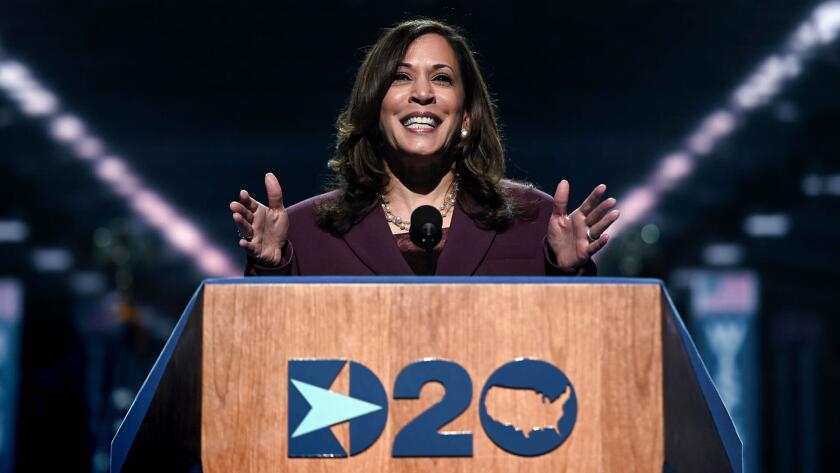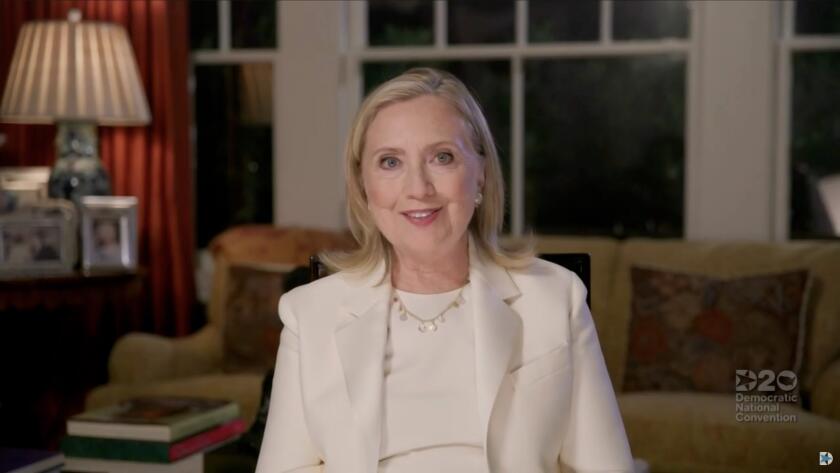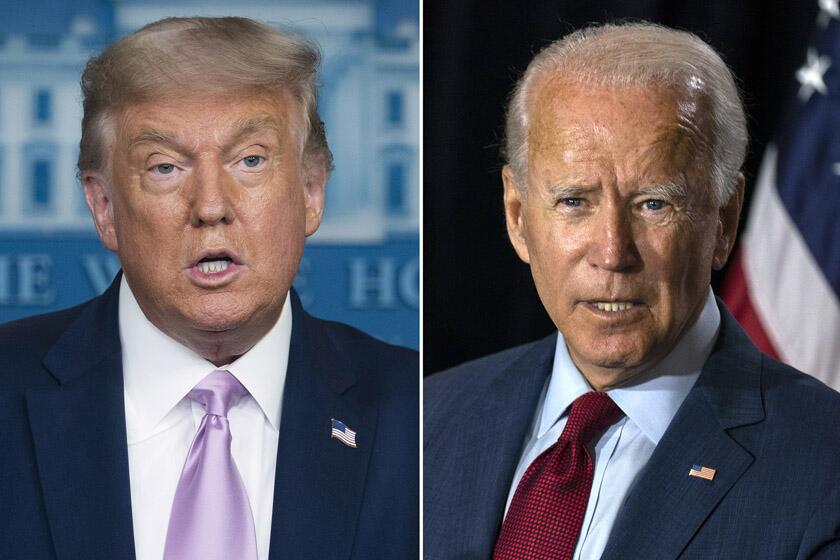Kamala Harris accepts vice presidential nomination — and a place in history
- Share via
Sen. Kamala Harris accepted the vice presidential nomination at the 2020 Democratic National Convention. She is the first Black woman and the first South Asian woman ever nominated, and Democrats’ first vice presidential pick from west of the Rockies.
- Share via
MILWAUKEE — Kamala Harris stepped into history Wednesday night and accepted the Democratic nomination for vice president, offering her life story as the daughter of immigrants and calling on Americans to choose diversity over division after the upheaval of the Trump era.
In a stroke, California’s junior U.S. senator — whose mother came from India and father from Jamaica — became the first woman of color on a major party ticket. She is not only the first Black woman and the first South Asian ever nominated, but the first Democrat from west of the Rockies to run on a national ticket.
No crowd was on hand to cheer in the pandemic-limited event, so Harris stood before an elaborate display of U.S. flags and signs for all 50 states in a mostly empty hall in Wilmington, Del., as she framed the race between President Trump and Democratic nominee Joe Biden in stark, and often dark, terms.
Harris said the choice is between an incumbent who sows chaos and stokes discord, and “a president who will bring all of us together — Black, white, Latino, Asian, Indigenous — to achieve the future we collectively want.”
She hailed the vision her mother had instilled in her: “A country where we may not agree on every detail, but we are united by the fundamental belief that every human being is of infinite worth, deserving of compassion, dignity and respect.”
“Today, that country feels distant,” she said. “Donald Trump’s failure of leadership has cost lives and livelihoods.”
The third night of the Democratic National Convention was already charged by former President Obama’s eviscerating take-down of Trump, a rebuke all the more powerful because Obama had largely avoided criticizing his successor since leaving office.
Obama said Trump never grew into the presidency or put in the work required, and has sought to incite division, help his friends and seek attention for himself, rather than help those in need.
“The consequences of that failure are severe,” Obama said, citing the 170,000-plus Americans who have died from COVID-19 and the tens of millions who have lost their jobs.
“Our worst impulses unleashed,” Obama added, “our proud reputation around the world badly diminished, and our democratic institutions threatened like never before.”
Speaking from the Museum of the American Revolution in Philadelphia, the former president delivered an urgent warning about Trump’s efforts to limit voting by mail.
“This president and those in power, those who benefit from keeping things the way they are ... know they can’t win you over with their policies,” Obama said. “So they’re hoping to make it as hard as possible for you to vote, and to convince you that your vote doesn’t matter. That’s how they win.
“That’s how a democracy withers, until it’s no democracy at all,” Obama said. “We can’t let that happen. Do not let them take away your power. Don’t let them take away your democracy.”
Trump has sought to undermine confidence in the election and the U.S. Postal Service has cut back service despite an expected flood of mail-in ballots during the pandemic as voters seek an alternative to in-person voting.
With P.V. Gopalan, an upright civil servant and doting patriarch, Kamala Harris forged one of the defining relationships of her life.
The night’s program included several path-breaking women, including the Democrats’ 2016 presidential nominee, Hillary Clinton, as well as House Speaker Nancy Pelosi of San Francisco and Sen. Elizabeth Warren of Massachusetts.
Nearly four years after a lack of enthusiasm helped cost Democrats the White House, one speaker after another warned against complacency and Trump’s efforts to suppress voter turnout.
“For four years, people have said to me, ‘I didn’t realize how dangerous he was,’” Clinton said, speaking from her home outside New York City. “Or worse, ‘I should have voted.’ Look, this can’t be another woulda, coulda, shoulda election.”
Trump responded to the attacks in signature style, insulting the speakers on Twitter. He posted a video that renewed some of his favorite conspiracy theories about Clinton and Obama, and suggested the former president’s support for Biden is phony.
The trolling, however, amplified Obama’s point that Trump has eroded the presidency.
- Share via
Hillary Clinton spoke Wednesday night at the Democratic National Convention.
A day after the 100th anniversary of women getting the right to vote, the event looked back — virtually — at the suffrage movement and looked ahead toward implementing a progressive agenda that confronts economic inequality, climate change and school violence.
A tribute to Pelosi, the most powerful elected woman in America and third in line for the presidency, chronicled her rise, and her combat with Trump.
“I’ve seen firsthand Donald Trump’s disrespect for facts, for working families, and for women in particular — disrespect written into his policies toward our health and our rights, not just his conduct,” Pelosi said from her San Francisco district.
“But we know what he doesn’t: that when women succeed, America succeeds.”
“We are unleashing the power of women to take our rightful place in our national life,” Pelosi said.
Before she appeared, there were a series of dramatic presentations emphasizing the damage Democrats say Trump’s attacks on immigrants and refusal to curb gun violence have had on the country.
Among those featured were an Indiana mother whose son was shot and severely disabled while dancing at a party as well as Democratic former Arizona Rep. Gabrielle Giffords, who nearly died in an attempted assassination.
“I have known the darkest of days,” Giffords said, after the video showed her in speech therapy and walking slowly with a limp across the room. “Words once came easily, but today I struggle to speak. But I have not lost my voice. America needs all of us to speak out, even when you have to fight to find the words. ... We can let the shooting continue, or we can act.”
An 11-year-old American girl named Estela Juarez, whose mother — a 20-year resident of this country — was recently deported, read a letter to Trump, spliced together with clips of him railing against immigrants. She told the president that her dad is a Marine who voted for him.
“My dad thought you would protect military families, so he voted for you,” Estela said. “He said he would not vote for you again after what you did to our family. Instead of protecting us, you have torn us apart. Now my mom is gone.”
Capping the two-hour online program was the formal nomination of Harris.
While groundbreaking, her role on the presidential ticket is carefully prescribed: to take the fight to Trump and let Biden stay on a relatively higher plane. The former prosecutor, who thrilled Democrats nationwide by lacerating Trump’s aides and nominees in Senate hearings, took to the chore without flinching.
“We have a president who turns our tragedies into political weapons,” she said.
Covering Kamala Harris
For the most part she spoke in the deliberate cadence of a lawyer as she spelled out her biography — the child of civil rights activists in the Bay Area, her career in law, the husband she met on a blind date — though Harris seemed to pause to collect herself as she reflected how her late mother would take in the scene.
She spoke at length of family — she was formally nominated by her younger sister, stepdaughter and niece — and compassionately about those who have lost their jobs or had their lives thrown off kilter by the COVID-19 pandemic.
Harris made a determined case for why Biden is right for the moment, but the ultimate testimonial for her running mate came from Obama.
A look at where President Trump and Joe Biden stand on key issues in the 2020 election, including healthcare, immigration, police reform and climate.
Obama and Biden were rivals in the 2008 presidential campaign before Biden dropped out of the race. Earlier, serving together in the Senate, Obama had chafed at what he considered Biden’s verbosity and self-import. His decision to pick Biden for vice president was purely pragmatic: Biden’s vast experience filled glaring holes in Obama’s thin resume.
That all changed, Obama said, when they served together in the White House.
“Twelve years ago, when I began my search for a vice president, I didn’t know I’d end up finding a brother,” Obama said. “Joe and I came from different places and different generations. But what I quickly came to admire about him is his resilience, born of too much struggle; his empathy, born of too much grief.”
“Joe’s a man who learned early on to treat every person he meets with respect and dignity, living by the words his parents taught him: ‘No one’s better than you, but you’re better than nobody,’” Obama said.
Biden and Harris, too, started this campaign as rivals.
When she launched her White House bid in January 2019, Harris immediately established herself as one of the Democratic front-runners taking on the former vice president.
Her faltering performance, however, failed to match the superlatives that surrounded her entry, and Harris became the first major candidate to drop out in December, before any votes were cast.
It was the first election Harris ever lost, but her efforts were hardly for naught. Her time on the national stage was one of the important factors that made Biden choose her as his running mate, setting the stage for Wednesday’s walk into the history books.
Halper reported from Washington and Barabak from Milwaukee.
More to Read
Get the L.A. Times Politics newsletter
Deeply reported insights into legislation, politics and policy from Sacramento, Washington and beyond. In your inbox three times per week.
You may occasionally receive promotional content from the Los Angeles Times.
















